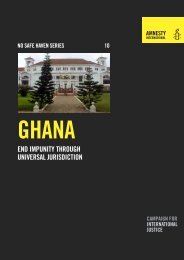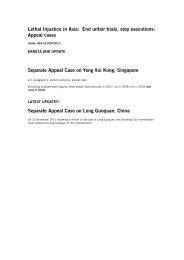read the report - Amnesty International
read the report - Amnesty International
read the report - Amnesty International
Create successful ePaper yourself
Turn your PDF publications into a flip-book with our unique Google optimized e-Paper software.
NIGERIA<br />
‘WAITING FOR THE HANGMAN’<br />
45<br />
According to <strong>the</strong> Prison Act, <strong>the</strong> Superintendent is responsible for “maintaining <strong>the</strong> gallows at<br />
all times in a proper condition and <strong>read</strong>y for use. He shall carefully examine <strong>the</strong> condition and<br />
mechanisms of <strong>the</strong> gallows from time to time and, in any case, on <strong>the</strong> last working day before<br />
<strong>the</strong> sheriff assumes responsibility prior to an execution.” 165<br />
A prisoner under sentence of death is allowed “such amount of alcoholic stimulant as <strong>the</strong><br />
medical officer may consider necessary.” 166<br />
After execution, <strong>the</strong> prisoner’s body is buried in “<strong>the</strong> prescribed place”, unless permission<br />
is given to return <strong>the</strong> body to friends or relatives. 167<br />
Convicts sentenced to death under Shari’a law are to be stoned to death. If a convict has not<br />
appealed within <strong>the</strong> time prescribed by law (30 days), a governor can affirm <strong>the</strong> sentence and<br />
ask for <strong>the</strong> execution to be carried out.<br />
THE DEATH PENALTY IN INTERNATIONAL LAW<br />
The Universal Declaration of Human Rights recognizes each person’s right to life.<br />
Fur<strong>the</strong>rmore, it states that “No one shall be subjected to torture or to cruel, inhuman or<br />
degrading treatment or punishment.” 168<br />
Article 6 of <strong>the</strong> ICCPR also guarantees <strong>the</strong> right to life. The second provision of this article<br />
states: “In countries which have not abolished <strong>the</strong> death penalty, sentence of death may be<br />
imposed only for <strong>the</strong> most serious crimes in accordance with <strong>the</strong> law in force at <strong>the</strong> time of <strong>the</strong><br />
commission of <strong>the</strong> crime …. This penalty can only be carried out pursuant to a final judgment<br />
rendered by a competent court.” The second Optional Protocol to <strong>the</strong> ICCPR (which Nigeria<br />
has not ratified) aims at <strong>the</strong> abolition of <strong>the</strong> death penalty.<br />
The UN Human Rights Committee has stated: “The Committee is of <strong>the</strong> opinion that <strong>the</strong><br />
expression ‘most serious crimes’ must be <strong>read</strong> restrictively to mean that <strong>the</strong> death penalty should<br />
be a quite exceptional measure.” 169 The Committee said that <strong>the</strong> following offences cannot be<br />
characterized as <strong>the</strong> “most serious crimes” under <strong>the</strong> ICCPR: economic offences, political offences,<br />
robbery, abduction not resulting in death, illicit sex, committing a homosexual act, and apostasy.<br />
The Committee also stated that Article 6 “refers generally to abolition [of <strong>the</strong> death penalty] in<br />
terms which strongly suggest... that abolition is desirable. The Committee concludes that all<br />
measures of abolition should be considered as progress in <strong>the</strong> enjoyment of <strong>the</strong> right to life”. 170<br />
Under <strong>the</strong> Rome Statute of <strong>the</strong> <strong>International</strong> Criminal Court, <strong>the</strong> death penalty is excluded,<br />
even though <strong>the</strong> Court has jurisdiction over crimes against humanity, genocide and war crimes.<br />
The UN Economic and Social Council, <strong>the</strong> UN Human Rights Committee and <strong>the</strong> UN<br />
Commission on Human Rights have all urged UN member states to make public information<br />
on <strong>the</strong>ir use of <strong>the</strong> death penalty, including <strong>the</strong> offences for which it is authorized and full<br />
details of its imposition. 171<br />
Index: AFR 44/020/2008 <strong>Amnesty</strong> <strong>International</strong> October 2008

















